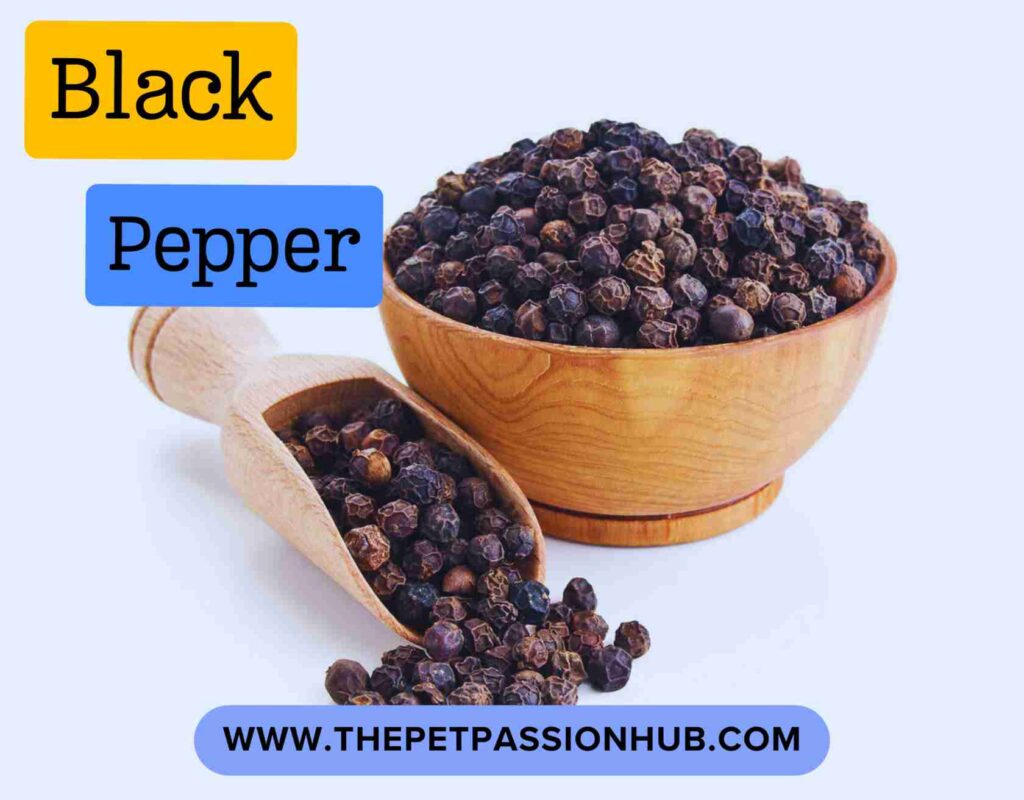Introduction
As dog owners, we are constantly on the lookout for ingredients that can either enrich or endanger our beloved pets’ diet.
Black pepper – a staple in most kitchens and a classic flavor enhancer – often flies under the radar when considering potential dog food ingredients. But should it?
In this article, we will delve into the effects of black pepper on your four-legged friends’ health and help you understand if this spice deserves its place in your dog’s bowl.
1. Understanding Your Dog’s Diet
For professional and budding pet-parents alike, understanding your dog’s diet may seem like a labyrinthine challenge.
But it doesn’t have to be overly complex; sometimes, you only need to keep in mind the fundamental pet care tips—like knowing which types of food are beneficial for your dogs and what could possibly harm them. Among these items is black pepper.
Black pepper has been a topic of controversy among animal specialists—its effects on dogs can be quite intricate.
Though most humans revel in the kick that black pepper adds to meals, our beloved canines may not share that same sentiment.
By familiarizing yourself with the topic of your dog’s diet, you’re taking an essential leap towards creating a healthy lifestyle for your canine companion.
2. The Basics: What is Black Pepper?
Diving into the heart of this topic, we first need to explore what black pepper is. Beyond being your table’s perennial companion to salt, black pepper is a must-have spice that makes its way into a variety of recipes across global cuisines.
It’s obtained from an unripe fruit borne by Piper nigrum, a tropical plant native to Southern India. Upon drying under the sun or through machine processing, these green fruits develop their characteristic wrinkled black appearance and pungent flavor.

Now, why do we bring up this conversation on countertop spices? Because as pet owners exploring food safety for dogs and figuring out safe spices for dogs is paramount.
Before adopting a more diverse menu for your canine companion or resorting to home remedies involving common household ingredients such as black pepper, it’s essential you understand their nature fully.
Stay with us to enhance your knowledge about Can Dogs Eat Black Pepper? Is Black Pepper Safe for Dogs?
Can Dogs Eat Peppercorn? 3 things you need to know about Black Pepper
3. Can Dogs Consume Black Pepper Safely?
Using black pepper as a spice in your dog’s food adds warmth and depth that might be appreciated by their taste buds. Though it is harmless when used sparingly, it’s not one of the most recommended dog food ingredients.
However, using too much black pepper can cause gastrointestinal upset in dogs, making them uncomfortable and unwell.
Loads of this spice might also lead to serious health risks for dogs such as difficulty breathing or skin irritation.
Hence, while black pepper isn’t toxic to our canine companions, it’s often best kept away from their diet whenever possible for optimum health.
4. Potential Risks and Hazards for Dogs
While understanding canine nutrition can be overwhelming due to the variety of diet plans and food choices available, it is also intricately intriguing.
This is more so when you ponder on a certain spice that’s almost ubiquitous in our kitchen – black pepper. Ubiquitous but perhaps underestimated in terms of its influence on our furry friends’ health.
This leads us to ask: Is black pepper safe for puppies? Peeking under the hood, while black pepper isn’t exactly poisonous for dogs, too much of it can cause tummy trouble like diarrhea and vomiting.
Our fur-babies may also suffer from respiratory issues if they accidentally inhale ground pepper! Mapping these potential risks and hazards helps ensure we provide a safe environment where our loyal companions can thrive.
Hence, your venture into understanding doggy dietary needs could very well be one of the most rewarding journeys ever taken.
Please stay with us if you want to learn more about 6 Outstanding Facts. “Can Dog Eat Tamarind ?” (With FAQs)
5 Outstanding Facts ,Can A Dog Eat Hominy? (Updated)
5. Other Spices and Foods to Avoid
Beyond black pepper, there are several other spices and foods that are discouraged according to canine dietary guidelines.
For instance, onion and garlic – whether powdered or whole – can potentially cause anemia in dogs due to their sulfur-containing compounds. Additionally, macadamia nuts can lead to weakness, depression, vomiting, tremors and hyperthermia within 24 hours of ingestion.
Even certain fruits like grapes and raisins could pose serious health risks for your furry friend. They have been linked with acute kidney failure in dogs.
Often overlooked, even nutmeg can negatively affect your pet’s health causing seizures or central nervous system damage.
By adhering to specific canine dietary guidelines you not only steer clear of emergency vet trips but also contribute actively towards your pet’s prolonged health and vitality.
6. Safe Alternatives to Black Pepper for Dogs
Switching up spices while prepping meals for your dog can be a delightful adventure.
However, we all know by now that black pepper, among some other culinary staples, is on the list of edible items dangerous to dogs.
But as responsible dog parents who enjoy spice and still want our furry pals to experience the same delight without harming them, what safe alternatives are there?
Turmeric is one such alternative; it is not only safe but beneficial for your furry friend’s health as well. It possesses potent anti-inflammatory properties which can contribute to the overall wellness of your pooch in many ways.
Carrot powder and beet powder are two other wholesome substitutes, adding vibrancy along with health benefits to their meal plate.
With these options available, you won’t have to worry about depriving Fido of some tickling taste sensations while keeping his safety paramount!
Conclusion: Balancing Flavor and Safety in Dog Diets
In the conclusion, our exploration of nutrition facts for dog food has led us to understand a balance between flavor and safety must be achieved.
Canine dietary health can’t merely revolve around making their meals ‘tasty’ like with black pepper; it’s crucially about ensuring feeding provisions that promote longevity and overall well-being.
Pepper may seem innocuous in our meals, but as we’ve learned, it can disrupt dog digestion significantly.
Therefore creating a flavorful yet safe diet for your fur friend might indeed mean skipping ingredients that we humans relish.
Balancing safety against taste might be tough initially, but once you adapt and see positive changes in your pup’s wellness profile, there will be no looking back! After all, the ultimate culinary delight is witnessing your canine companion relishing their meal while staying healthy!
FAQs
- Q: Can dogs safely eat black pepper?
A: No, black pepper isn’t recommended for dogs as it can cause gastrointestinal upset. - Q: What happens if my dog ingests a large amount of black pepper?
A: If ingested in large amounts, black pepper can lead to symptoms like diarrhea, vomiting, and discomfort in your dog. - Q: Is there any immediate remedy if my dog accidentally consumed black pepper?
A: If you suspect your dog has consumed a lot of black pepper, the best course of action is to contact your vet immediately for advice. - Q: Are other spices harmful to dogs apart from black pepper?
A: Yes, several other spices such as nutmeg, onion powder and garlic powder are also harmful to dogs. - Q: Can I use black pepper as a repellent for my dog?
A: While some people may suggest this, it’s not suitable or ethical to use black pepper as a repellent due to its potential health hazards for the pet. - Q: Do all dogs react the same way to black pepper?
A: Not necessarily. Different dogs can have different reactions but since many will experience discomfort, it’s better to err on the side of caution and avoid giving it altogether. - Q: Can I give food seasoned with black pepper to my dog?
A: It’s advisable not to feed your dog food that contains any amount of black pepper. - Q: How should I keep my spices including black pepper out of reach from my pets?
A: Keep all spices in high cupboards or shelves where your pets cannot reach them.
